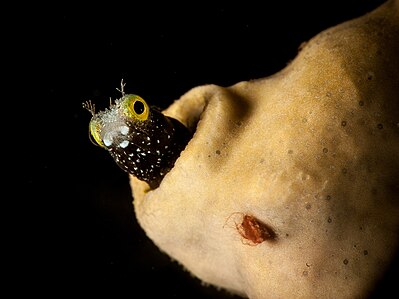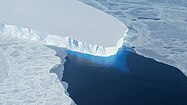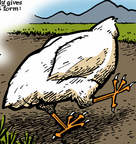Wikipedia:Main Page history/2023 September 10b
From today's featured article
Rotating locomotion in living systems includes both the rolling of entire organisms, and the use of structures that propel by rotating relative to a fixed body, such as a wheel or propeller. Though the former mode is used by varied forms of life, including pangolins and tumbleweeds, the latter is only known to occur in bacteria using microscopic, corkscrew-like flagella. While other human technologies, like wings and lenses, have common natural analogues, multicellular organisms have apparently never evolved rotating propulsive structures. Such structures may be infeasible to grow and maintain with biological processes. Compared with walking or running on limbs, in natural environments, wheeled propulsion is rarely as energy-efficient, versatile, or capable of navigating obstacles. This is likely why wheels were regionally abandoned at least once in history. Rolling and wheeled creatures have appeared in speculative fiction and the legends of many cultures. (Full article...)
Did you know ...
- ... that Thwaites Glacier (pictured) in Antarctica is expected to add 65 cm (26 in) to global sea levels over the coming centuries?
- ... that The Librarian was part of the shift by computer programmers away from using punched cards?
- ... that DeepStateMap.Live, an interactive map of the Russian invasion of Ukraine, received up to 120,000 visitors in 30 minutes during the Battle of Izium in the 2022 Kharkiv counteroffensive?
- ... that several science fiction critics praised "Rock Diver", the first short story by American writer Harry Harrison, for its compelling take on technology for passing through matter?
- ... that the first road tunnel in England, opened in 1823 in Reigate, Surrey, runs under the site of a medieval castle?
- ... that an initial gameplay concept for Diggin' Dogs was "possibly going to be worms eating into a diseased brain", with design input from Edmund McMillen?
- ... that Wagner Group head of logistics Valery Chekalov, who was killed in the 2023 Tver Oblast plane crash, used the call sign "Rover"?
- ... that Australian politicians may face the pub test?
In the news

- An earthquake (damage pictured) strikes Morocco, killing more than 2,100 people.
- Tharman Shanmugaratnam is elected as the next president of Singapore.
- In Johannesburg, South Africa, a residential fire kills 77 people.
- In Gabon, President Ali Bongo is deposed by a military coup shortly after his re-election.
On this day
- 1509 – The "Minor Judgement Day" earthquake struck in the Sea of Marmara, devastating much of Constantinople and killing more than 1,000 people.
- 1779 – American Revolutionary War: Captain William Pickles of the Continental Navy boarded and captured the British sloop HMS West Florida at the Battle of Lake Pontchartrain.
- 1945 – Mike the Headless Chicken (pictured) was decapitated on a farm in Colorado; he survived another 18 months as part of sideshows before choking to death.
- 1974 – After centuries of Portuguese rule, the country of Guinea-Bissau was formally recognized as independent.
- 1983 – Typhoon Ellen dissipated after destroying hundreds of homes across Hong Kong and the Philippines.
- Empress Matilda (d. 1167)
- Richard Temple-Nugent-Brydges-Chandos-Grenville, 3rd Duke of Buckingham and Chandos (b. 1823)
- H.D. (b. 1886)
- Abdul Hamid (d. 1965)
Today's featured picture

|
The spinyhead blenny (Acanthemblemaria spinosa) is a species of blenny native to the tropical western Atlantic Ocean and Caribbean Sea, with a range extending from the Antilles, the Bahamas, and Florida to Curaçao. It typically inhabits small, rocky reefs surrounded by sand, and is known as a tube blenny from its habit of occupying a hole in a coral or an empty worm tube from which it pokes out its head. The fish has a mottled black, white and red coloration over the entire body, which is rather elongated. As with most blennies, its head has small, hair-like appendages over the eyes, which are large and red. The dorsal fin has 20 to 22 spines and 13 to 16 soft rays. The anal fin has two spines and 21 to 25 soft rays. It grows to a total length of 2.8 cm (1.1 in). Photograph credit: q phia
Recently featured:
|
Other areas of Wikipedia
- Community portal – The central hub for editors, with resources, links, tasks, and announcements.
- Village pump – Forum for discussions about Wikipedia itself, including policies and technical issues.
- Site news – Sources of news about Wikipedia and the broader Wikimedia movement.
- Teahouse – Ask basic questions about using or editing Wikipedia.
- Help desk – Ask questions about using or editing Wikipedia.
- Reference desk – Ask research questions about encyclopedic topics.
- Content portals – A unique way to navigate the encyclopedia.
Wikipedia's sister projects
Wikipedia is written by volunteer editors and hosted by the Wikimedia Foundation, a non-profit organization that also hosts a range of other volunteer projects:
-
Commons
Free media repository -
MediaWiki
Wiki software development -
Meta-Wiki
Wikimedia project coordination -
Wikibooks
Free textbooks and manuals -
Wikidata
Free knowledge base -
Wikinews
Free-content news -
Wikiquote
Collection of quotations -
Wikisource
Free-content library -
Wikispecies
Directory of species -
Wikiversity
Free learning tools -
Wikivoyage
Free travel guide -
Wiktionary
Dictionary and thesaurus
Wikipedia languages
This Wikipedia is written in English. Many other Wikipedias are available; some of the largest are listed below.
-
1,000,000+ articles
-
250,000+ articles
-
50,000+ articles



